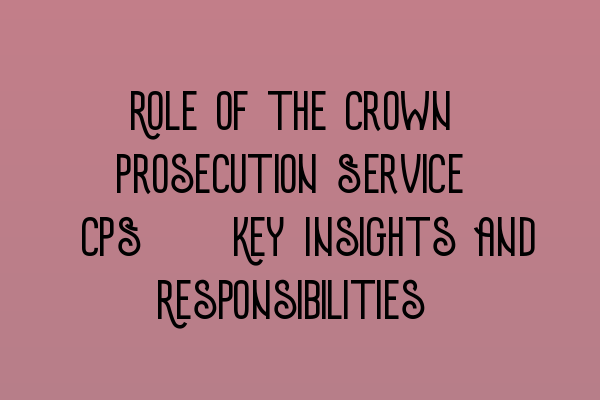Role of the Crown Prosecution Service (CPS): Key Insights and Responsibilities
Welcome to the SQE Criminal Law & Practice Law UK blog! In this article, we will explore the important role of the Crown Prosecution Service (CPS) in the criminal justice system of the United Kingdom. As a solicitor, it is crucial to understand the responsibilities and functions of the CPS to effectively navigate the legal landscape.
What is the Crown Prosecution Service (CPS)?
The Crown Prosecution Service (CPS) is an independent prosecuting authority in England and Wales. Its primary function is to prosecute criminal cases on behalf of the Crown. The CPS plays a vital role in ensuring that justice is served and that those who commit crimes are held accountable.
Responsibilities of the CPS
The CPS is responsible for making decisions about whether to charge individuals with criminal offenses based on the evidence provided by the police. This decision-making process is guided by the Code for Crown Prosecutors, which sets out the principles that must be followed to determine whether there is sufficient evidence to secure a conviction.
The CPS also has the responsibility to review cases after charges have been brought to ensure that there is still sufficient evidence to proceed with a prosecution. In some cases, the CPS may decide to discontinue proceedings if the evidence is no longer considered strong enough to secure a conviction.
Additionally, the CPS plays a crucial role in preparing and presenting cases in court. Crown Prosecutors are responsible for outlining the evidence to the court, calling witnesses, and presenting arguments to support the prosecution’s case. Their aim is to secure a conviction and to advocate for appropriate sentencing.
Collaboration and Ethical Considerations
The CPS works closely with various stakeholders in the criminal justice system, including the police, defense lawyers, judges, and court staff. Effective collaboration ensures that cases are handled efficiently and that justice is served. It is essential for solicitors to understand the dynamics of these collaborations to best represent their clients.
Furthermore, ethical considerations are of paramount importance in the work of the CPS. Upholding professional standards and conducting prosecutions in a fair and impartial manner is crucial for maintaining public trust in the criminal justice system.
Conclusion
The Crown Prosecution Service (CPS) is a key institution in the criminal justice system of the United Kingdom. Understanding its role and responsibilities is essential for solicitors practicing criminal law. From making charging decisions to presenting cases in court, the CPS plays a critical role in ensuring justice is served.
If you want to learn more about the legal profession and related topics, check out our other informative articles:
